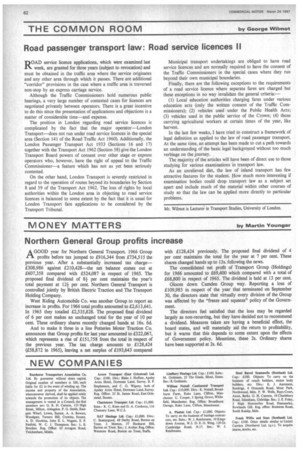THE COMMON ROOM by George Wilmot
Page 64

If you've noticed an error in this article please click here to report it so we can fix it.
Road passenger transport law: Road service licences II
ROAD service licence applications, which were examined last week, are granted for three years (subject to revocation) and must be obtained in the traffic area where the service originates and any other area through which it passes. There are additional "corridor" provisions in the case where a traffic area is traversed non-stop by an express carriage service.
Although the Traffic Commissioners hold numerous public hearings, a very large number of contested cases for licences are negotiated privately between operators. There is a great incentive to do this since the presentation of applications and objections is a matter of considerable time—and expense.
The position in London regarding road service licences is complicated by the fact that the major operator—London Transport—does not run under road service licences in the special area (Section 141 of the Road Traffic Act 1960). Additionally, the London Passenger Transport Act 1933 (Sections 16 and 17) together with the Transport Act 1962 (Section 58) give the London Transport Board powers of consent over other stage or express operators who, however, have the right of appeal to the Traffic Commissioner—a feature which has not as yet been seriously contested.
On the other hand, London Transport is severely restricted in regard to the operation of routes beyond its boundaries by Section 8 and 59 of the Transport Act 1962. The loss of rights by local authorities within the London area in objecting to road service licences is balanced to some extent by the fact that it is usual for London Transport fare applications to be considered by the Transport Tribunal. Municipal transport undertakings are obliged to have road service licences and are normally required to have the consent of the Traffic Commissioners in the special cases where they run beyond their own municipal boundaries.
Finally, there are the following exceptions to the requirements of a road service licence where separate fares are charged but these exceptions in no way invalidate the general criteria:— (I) Local education authorities charging fares under various education acts (only the written consent of the Traffic Commissioners); (2) vehicles used under the Public Health Acts; (3) vehicles used in the public service of the Crown; (4) those carrying agricultural workers at certain times of the year, like harvest.
In the last few weeks, I have tried to construct a framework of legal definition as applied to the law of road passenger transport. At the same time, an attempt has been made to cut a path towards an understanding of the basic legal background without too much verbiage on the journey.
The majority of the articles will have been of direct use to those studying for various examinations in transport law.
As an unrelieved diet, the law of inland transport has few attractive features for the student. How much moreinteresting if examination bodies could drop transport law as a subject set apart and include much of the material within other courses of study so that the law can be applied more directly to particular problems.
Mr. Wilmot is Lecturer in Transport Studies, University of London.








































































































